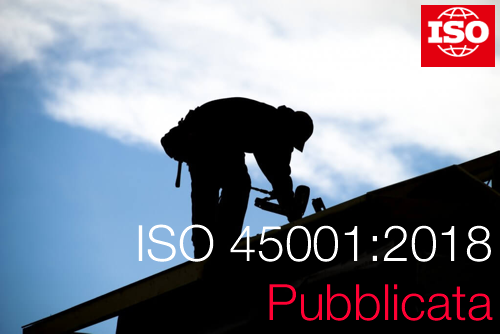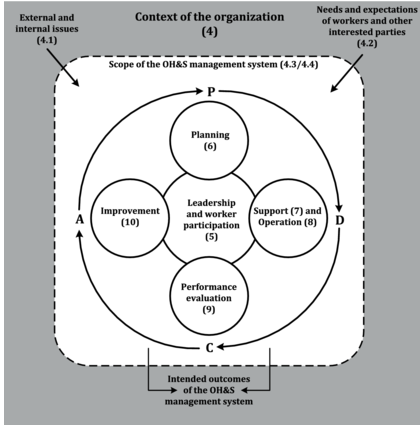ISO 45001:2018 | Pubblicata il 12 marzo 2018
| Appunti Sicurezza lavoro | ||
| 06 Luglio 2025 | ||
| Salve Visitatore | ||
|
ISO 45001:2018 OH&S management systems | Pubblicata ISO 12 marzo 2018 ISO 45001:2018 specifies requirements for an occupational health and safety (OH&S) management system, and gives guidance for its use, to enable organizations to provide safe and healthy workplaces by preventing work-related injury and ill health, as well as by proactively improving its OH&S performance. ISO 45001:2018 is applicable to any organization that wishes to establish, implement and maintain an OH&S management system to improve occupational health and safety, eliminate hazards and minimize OH&S risks (including system deficiencies), take advantage of OH&S opportunities, and address OH&S management system nonconformities associated with its activities. ISO 45001:2018 helps an organization to achieve the intended outcomes of its OH&S management system. Consistent with the organization's OH&S policy, the intended outcomes of an OH&S management system include: a) continual improvement of OH&S performance; b) fulfilment of legal requirements and other requirements; c) achievement of OH&S objectives. ISO 45001:2018 is applicable to any organization regardless of its size, type and activities. It is applicable to the OH&S risks under the organization's control, taking into account factors such as the context in which the organization operates and the needs and expectations of its workers and other interested parties. ISO 45001:2018 does not state specific criteria for OH&S performance, nor is it prescriptive about the design of an OH&S management system. ISO 45001:2018 enables an organization, through its OH&S management system, to integrate other aspects of health and safety, such as worker wellness/wellbeing. ISO 45001:2018 does not address issues such as product safety, property damage or environmental impacts, beyond the risks to workers and other relevant interested parties. ISO 45001:2018 can be used in whole or in part to systematically improve occupational health and safety management. However, claims of conformity to this document are not acceptable unless all its requirements are incorporated into an organization's OH&S management system and fulfilled without exclusion. ... General information: Current status: Published Publication date : 2018-03 ... Preview Foreword ISO (the International Organization for Standardization) is a worldwide federation of national standards bodies (ISO member bodies). The work of preparing International Standards is normally carried out through ISO technical committees. Each member body interested in a subject for which a technical committee has been established has the right to be represented on that committee. International organizations, governmental and non-governmental, in liaison with ISO, also take part in the work. ISO collaborates closely with the International Electrotechnical Commission (IEC) on all matters of electrotechnical standardization. The procedures used to develop this document and those intended for its further maintenance are described in the ISO/IEC Directives, Part 1. In particular the different approval criteria needed for the different types of ISO documents should be noted. This document was drafted in accordance with the editorial rules of the ISO/IEC Directives, Part 2 (see www.iso.org/directives). Any trade name used in this document is information given for the convenience of users and does not constitute an endorsement. For an explanation on the voluntary nature of standards, the meaning of ISO specific terms and expressions related to conformity assessment, as well as information about ISO’s adherence to the World Trade Organization (WTO) principles in the Technical Barriers to Trade (TBT) see the following URL: www.iso.org/iso/foreword.html. This document was prepared by Project Committee ISO/PC 283, Occupational health and safety management systems. Introduction 0.1 Background An organization is responsible for the occupational health and safety of workers and others who can be affected by its activities. This responsibility includes promoting and protecting their physical and mental health. The adoption of an OH&S management system is intended to enable an organization to provide safe and healthy workplaces, prevent work-related injury and ill health, and continually improve its OH&S performance. 0.2 Aim of an OH&S management system The purpose of an OH&S management system is to provide a framework for managing OH&S risks and opportunities. The aim and intended outcomes of the OH&S management system are to prevent work-related injury and ill health to workers and to provide safe and healthy workplaces; consequently, it is critically important for the organization to eliminate hazards and minimize OH&S risks by taking effective preventive and protective measures. When these measures are applied by the organization through its OH&S management system, they improve its OH&S performance. An OH&S management system can be more effective and efficient when taking early action to address opportunities for improvement of OH&S performance. Implementing an OH&S management system conforming to this document enables an organization to manage its OH&S risks and improve its OH&S performance. An OH&S management system can assist an organization to fulfil its legal requirements and other requirements. 0.3 Success factors The implementation of an OH&S management system is a strategic and operational decision for an organization. The success of the OH&S management system depends on leadership, commitment and participation from all levels and functions of the organization. The implementation and maintenance of an OH&S management system, its effectiveness and its ability to achieve its intended outcomes are dependent on a number of key factors, which can include: a) top management leadership, commitment, responsibilities and accountability; Demonstration of successful implementation of this document can be used by an organization to give assurance to workers and other interested parties that an effective OH&S management system is in place. Adoption of this document, however, will not in itself guarantee prevention of work-related injury and ill health to workers, provision of safe and healthy workplaces and improved OH&S performance. The level of detail, the complexity, the extent of documented information and the resources needed to ensure the success of an organization’s OH&S management system will depend on a number of factors, such as: - the organization’s context (e.g. number of workers, size, geography, culture, legal requirements and other requirements); 0.4 Plan-Do-Check-Act cycle The OH&S management system approach applied in this document is founded on the concept of Plan-Do-Check-Act (PDCA). The PDCA concept is an iterative process used by organizations to achieve continual improvement. It can be applied to a management system and to each of its individual elements, as follows: a) Plan: determine and assess OH&S risks, OH&S opportunities and other risks and other opportunities, establish OH&S objectives and processes necessary to deliver results in accordance with the organization’s OH&S policy; This document incorporates the PDCA concept into a new framework, as shown in Figure 1. Figure 1 — Relationship between PDCA and the framework in this document
0.5 Contents of this document This document conforms to ISO’s requirements for management system standards. These requirements include a high level structure, identical core text and common terms with core definitions, designed to benefit users implementing multiple ISO management system standards. This document does not include requirements specific to other subjects, such as those for quality, social responsibility, environmental, security or financial management, though its elements can be aligned or integrated with those of other management systems. This document contains requirements that can be used by an organization to implement an OH&S management system and to assess conformity. An organization that wishes to demonstrate conformity to this document can do so by: Clauses 1 to 3 in this document set out the scope, normative references and terms and definitions which apply to the use of this document, while Clauses 4 to 10 contain the requirements to be used to assess conformity to this document. Annex A provides informative explanations to these requirements. The terms and definitions in Clause 3 are arranged in conceptual order, with an alphabetical index provided at the end of this document. In this document, the following verbal forms are used: Information marked as “NOTE” is for guidance in understanding or clarifying the associated requirement. “Notes to entry” used in Clause 3 provide additional information that supplements the terminological data and can contain provisions relating to the use of a term. 1 Scope This document specifies requirements for an occupational health and safety (OH&S) management system, and gives guidance for its use, to enable organizations to provide safe and healthy workplaces by preventing work-related injury and ill health, as well as by proactively improving its OH&S performance. This document is applicable to any organization that wishes to establish, implement and maintain an OH&S management system to improve occupational health and safety, eliminate hazards and minimize OH&S risks (including system deficiencies), take advantage of OH&S opportunities, and address OH&S management system nonconformities associated with its activities. This document helps an organization to achieve the intended outcomes of its OH&S management system. Consistent with the organization’s OH&S policy, the intended outcomes of an OH&S management system include: 2 Normative references 3 Terms and definitions 3.1 3.2 3.3 3.4 3.5 3.6 ... Segue Fonte: ISO Info e download preview |
||
|
|
||
 |
||
|
è un sito di INVIO NEWSLETTTER Se vuoi cancellarti dall'invio della newsletter oppure effettua il login al sito ed entra nella Tua Area Riservata, in “Modifica dati” agisci con la spunta sul box di selezione “Newsletter”. L'Elenco completo di tutte le ns newsletter è qui: Archivio newsletter |
||
  |
||
| Certifico Srl 2000-2018 | VAT IT02442650541 | ||



































